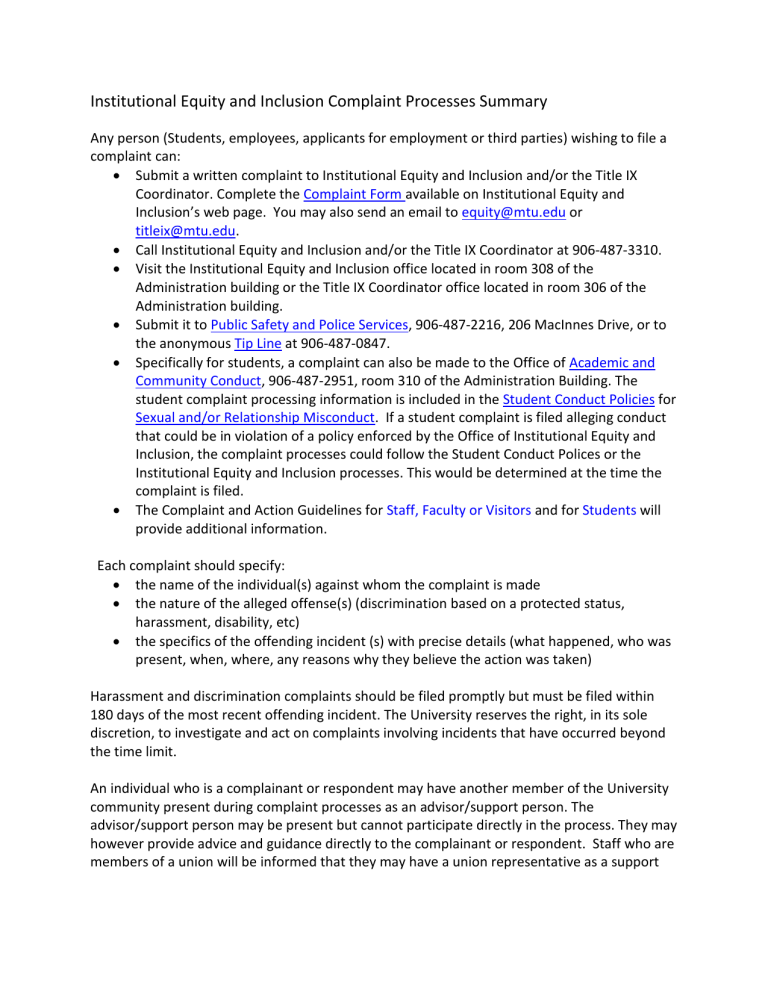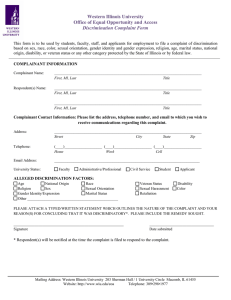Institutional Equity and Inclusion Complaint Processes Summary

Institutional Equity and Inclusion Complaint Processes Summary
Any person (Students, employees, applicants for employment or third parties) wishing to file a complaint can:
• Submit a written complaint to Institutional Equity and Inclusion and/or the Title IX
Coordinator. Complete the Complaint Form available on Institutional Equity and
Inclusion’s web page. You may also send an email to equity@mtu.edu
or titleix@mtu.edu
.
• Call Institutional Equity and Inclusion and/or the Title IX Coordinator at 906-487-3310.
• Visit the Institutional Equity and Inclusion office located in room 308 of the
Administration building or the Title IX Coordinator office located in room 306 of the
Administration building.
• Submit it to Public Safety and Police Services , 906-487-2216, 206 MacInnes Drive, or to the anonymous Tip Line at 906-487-0847.
• Specifically for students, a complaint can also be made to the Office of Academic and
Community Conduct , 906-487-2951, room 310 of the Administration Building. The student complaint processing information is included in the Student Conduct Policies for
Sexual and/or Relationship Misconduct . If a student complaint is filed alleging conduct that could be in violation of a policy enforced by the Office of Institutional Equity and
Inclusion, the complaint processes could follow the Student Conduct Polices or the
Institutional Equity and Inclusion processes. This would be determined at the time the complaint is filed.
• The Complaint and Action Guidelines for Staff, Faculty or Visitors and for Students will provide additional information.
Each complaint should specify:
• the name of the individual(s) against whom the complaint is made
• the nature of the alleged offense(s) (discrimination based on a protected status, harassment, disability, etc)
• the specifics of the offending incident (s) with precise details (what happened, who was present, when, where, any reasons why they believe the action was taken)
Harassment and discrimination complaints should be filed promptly but must be filed within
180 days of the most recent offending incident. The University reserves the right, in its sole discretion, to investigate and act on complaints involving incidents that have occurred beyond the time limit.
An individual who is a complainant or respondent may have another member of the University community present during complaint processes as an advisor/support person. The advisor/support person may be present but cannot participate directly in the process. They may however provide advice and guidance directly to the complainant or respondent. Staff who are members of a union will be informed that they may have a union representative as a support
person. All participants are expected to maintain confidentiality regarding any and all exchanges of information during the complaint processes.
During the pre-investigation evaluation period, the investigator will determine if:
• the complaint is timely
• the situation described in the complaint arose in the course of a University program or activity
• the complaint is in violation of a policy enforced by Institutional Equity and Inclusion
• the complaint is directed against a University employee, student, administrative unit, or third-party.
• A violation is factually supported such that the alleged behavior could constitute a policy violation.
If the complaint does not meet the above criteria or establish a violation of a policy enforced by the Institutional Equity and Inclusion, the case may be closed. However, the complaint may still be subject to University action if the alleged behavior violates another University policy or is otherwise inappropriate. In such event, Institutional Equity and Inclusion may refer the complaint to any other University office deemed appropriate for further review.
Requests from complainants to “just record my concerns” or “not take any action at this time” may, or may not, be honored depending on the circumstances involved. If at any time the
University feels an investigation is necessary, an investigation may proceed without the support of the potential complainant, even if that complainant requested no action.
Institutional Equity and Inclusion will determine the most effective method of investigating the allegations raised by the complainant. This will most likely involve conducting a thorough fact finding investigation, which includes separate meetings with the complainant, respondent, and witnesses with first-hand knowledge of the situation; and reviewing and analyzing relevant records as they relate to the allegations. The complainant, respondent, and witnesses will have the right to present information to the investigator. The investigator may be the Title IX
Coordinator, the university’s contracted investigator, a designee appointed by the Title IX
Coordinator or the Executive Director of Institutional Equity. It will be within the investigator’s discretion to determine the extent of investigation necessary and number of witnesses to be contacted to adequately determine the facts.
Participants in the process may be requested to document their statements in writing. If a person declines to provide a written statement or sign a statement taken by the investigator that documents their account of the incident (s), Institutional Equity and Inclusion will still conduct an investigation based upon all available information. However, at all times, those involved will receive a procedurally fair, prompt, and thorough evaluation.
The University will take interim measures as necessary to prevent the complainant and respondent from being subjected to further discrimination, harassment, or any retaliation during the investigative process. The University will take steps to reduce the likelihood that any
interim actions and measures taken will adversely affect the complainant. If informal resolution is possible it will be supported as an abbreviated process for less complicated matters that can be quickly resolved to the satisfaction of both parties. An example of such a matter might be a single comment that the complainant deemed objectionable and for which clarification can be provided. The informal process is completely voluntary, and both parties must agree. A complainant always has the right in every case to insist on a formal investigation and findings.
The University recognizes that there may be certain complaints, for example those involving sexual violence, where the informal process will never be appropriate.
Upon completion of the investigation the University investigator shall determine if there is prohibited conduct or discrimination under University Policies based upon a “preponderance of evidence” standard. This standard means that it is more likely than not that the prohibited discrimination occurred. The investigator will create a written report describing the findings and conclusions.
Institutional Equity and Inclusion will strive to complete the investigation within 60 days of receipt of the complaint. Notification of the outcome and the written report will be provided at the same time to both the complainant and respondent.
If the final report finds that a policy violation has occurred, the University will determine appropriate corrective action. The University will take steps to prevent reoccurrence of any discrimination with remedies including discipline ranging from verbal or written warnings, to probation, up to and including suspension or expulsion from the University as a student or termination from University employment or termination of tenure for serious or repeated violations.
If a respondent is found to have engaged in inappropriate workplace behavior as a University employee disciplinary action will be determined in accordance with applicable University
Policies, Human Resources practices and procedures and any applicable collective bargaining agreement. Third-parties who violate the policy are subject to corrective action, which may include removal from campus and termination of contractual agreements.
The University reserves the right to refer the complaint to the proper police or law enforcement agencies for criminal investigation, if so determined.
Incident reporting to the Department of Education or Office for Civil Rights (OCR) is an option for resolution of discrimination.
For students disagreeing with any decision the appeal process is noted in the Student Conduct
Policies for Sexual and/or Relationship Misconduct .
Employees who have a concern about the outcome of any investigation may seek further assistance through the Employee Complaints and Grievance policy and procedures, the Policy on Academic Tenure and Promotion , or their applicable bargaining agreement or contract.
The University will make every reasonable effort to maintain privacy for all parties involved and the confidentiality of information received to the extent allowable in accordance with state and federal laws and University policy. Timely cooperation is expected of all involved parties throughout the investigative process. All parties (complainant, respondent, witnesses, and advisors/support persons) are expected to be respectful and confidential during the process of an investigation.
Retaliation against any persons who participate in the complaint or investigation procedure is prohibited by federal and state law. Retaliation exists when action is taken against a participant
(whether a complainant, respondent, witness or investigator) which affects their employment, academic, or business status which is motivated in whole or in part by their participation in the process.
Conduct that constitutes retaliation for filing a complaint or participating in the complaint process may be found regardless of whether or not the underlying complaint is found to have merit. Persons who feel that they have been subject to retaliation because of filing or participating in the complaint procedure may file a complaint based on the alleged retaliation in the same manner as provided above for the initial complaint.
Any individual who knowingly files a false complaint under this policy, or who knowingly provides false information to, intentionally misleads, or knowingly withholds available requested information from University officials who are investigating a complaint, may be subject to disciplinary and/or corrective action.
The above is only a summary and all interested parties should consult the relevant University policies and procedures for additional information and sources of assistance including the following:
Board of Control Policies on Discrimination / Harassment
Institutional Equity and Inclusion Sex/Gender Discrimination, Harassment, and/or Sexual
Misconduct Policy
Office of Academic and Community Conduct
Revised June 30, 2015, August 25, 2015, February 25, 2016
